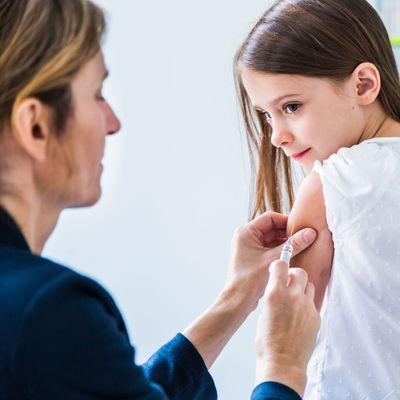
A new study suggests that family doctors aren’t the greatest when it comes to recommending that their preteen patients get a vaccine that can prevent multiple cancers, mostly because it involves talking to their patients’ parents about sex. Awkward.
Human papillomavirus is a sexually transmitted disease that can cause cancers of the cervix, vagina, vulva, anus, penis, or head and neck, and while there are two FDA-approved vaccines for HPV, Gardasil and Cervarix, adoption rates remain lower than the medical community would like. Earlier this year, the Centers for Disease Control and Prevention reported that only 40 percent of teen girls and 22 percent of teen boys had received all three doses of the HPV vaccine.
The vaccine got the side-eye from some parents from the start because the CDC recommends administering it to children ages 11 and 12. The argument is that they’ll be protected before they start having sex, but helicopter parents worried that it would make kids more promiscuous or forget about safe-sex credos. Thankfully, they were proven wrong by lots and lots of studies. Some moms and dads might still balk at the idea, but a new study suggests that family doctors’ ambivalence isn’t helping the situation: Researchers at Harvard Medical School and the University of North Carolina found that pediatricians and primary-care doctors treat the vaccine differently than other recommended shots when talking with their patients.
For the study published in the journal Cancer Epidemiology, Biomarkers & Prevention, they had 776 doctors complete an online survey that asked them how they recommended the vaccine to their patients based on five measures. They found that 26 percent of the docs didn’t recommend it in a timely fashion (by age 11 or 12) for girls; a sadder 39 percent could say that about boys; 59 percent were not consistent, recommending it more often for preteens they thought to be at higher risk instead of all of the kids; only half suggested getting the shot the same day; while 27 percent said they didn’t recommend it strongly.
Almost half of the doctors said they thought parents believed the vaccine was only slightly important or not important for their child. One third agreed that they expected the conversations about it to be uncomfortable, and a third said those talks would be awkward specifically because HPV is an STD. The authors said that the strength of the recommendation was higher when doctors broached it as a child being due for a suggested vaccination instead of talking about the context (sex!) or asking the parents if they had questions.
That’s probably the right approach, according to Jennifer Edman, an assistant professor of women’s primary care at Oregon Health & Science University, who wasn’t involved in the study. As she told NPR, “We need to make the vaccine not about sex but about routine cancer prevention.”




